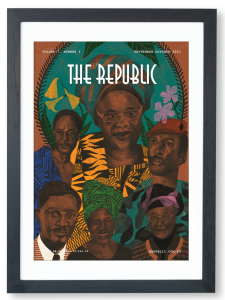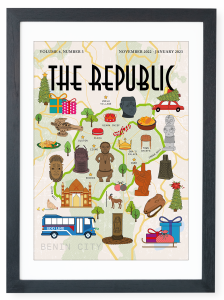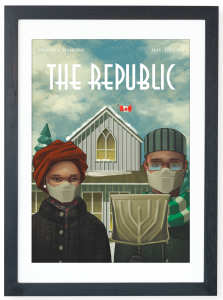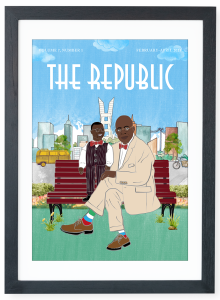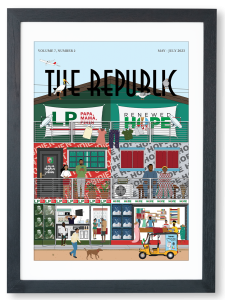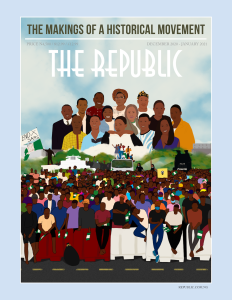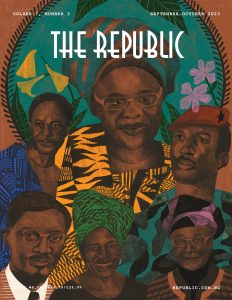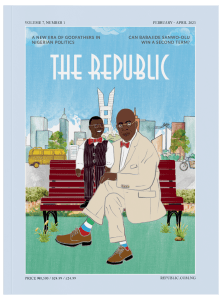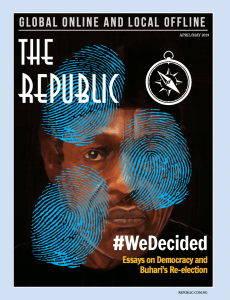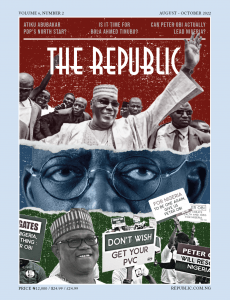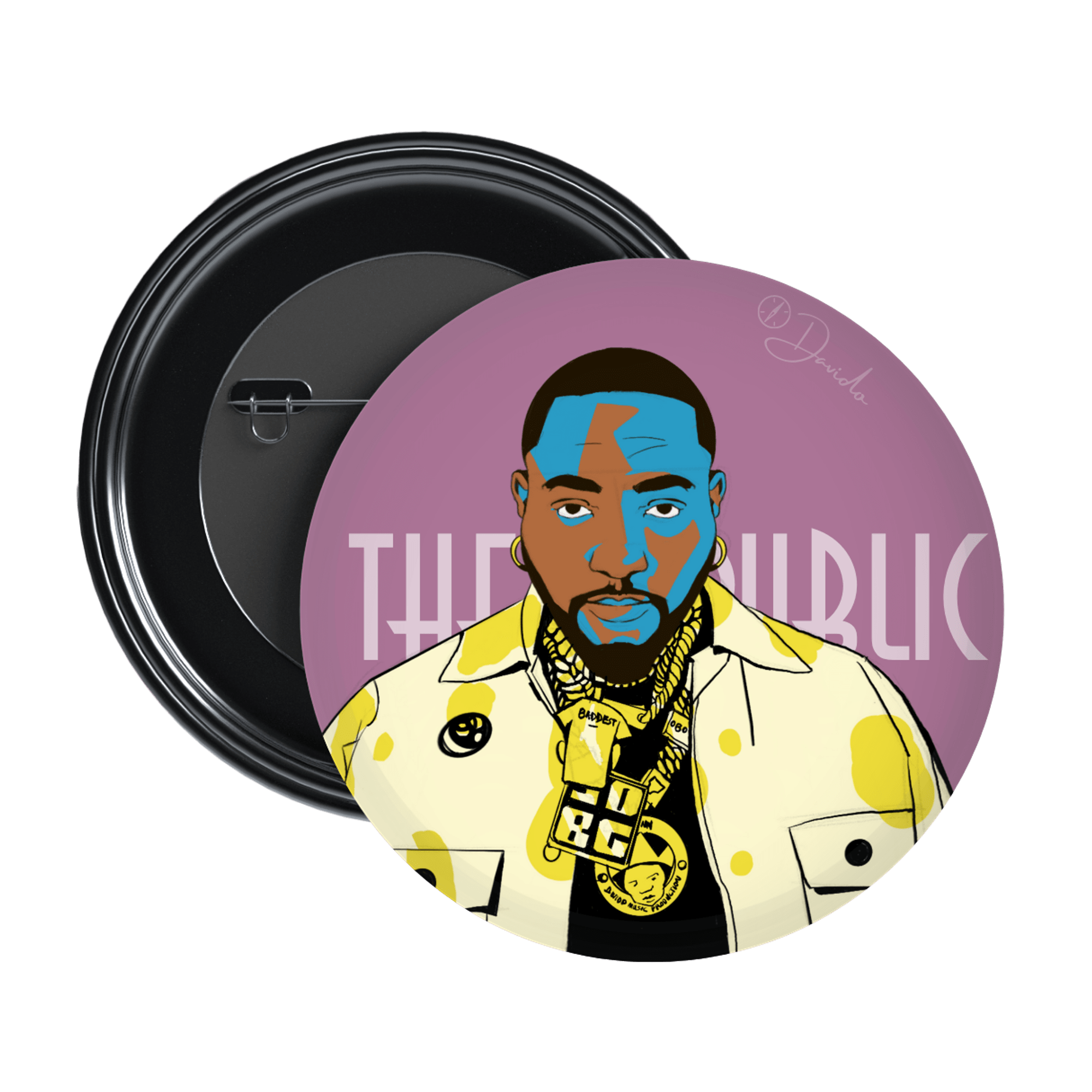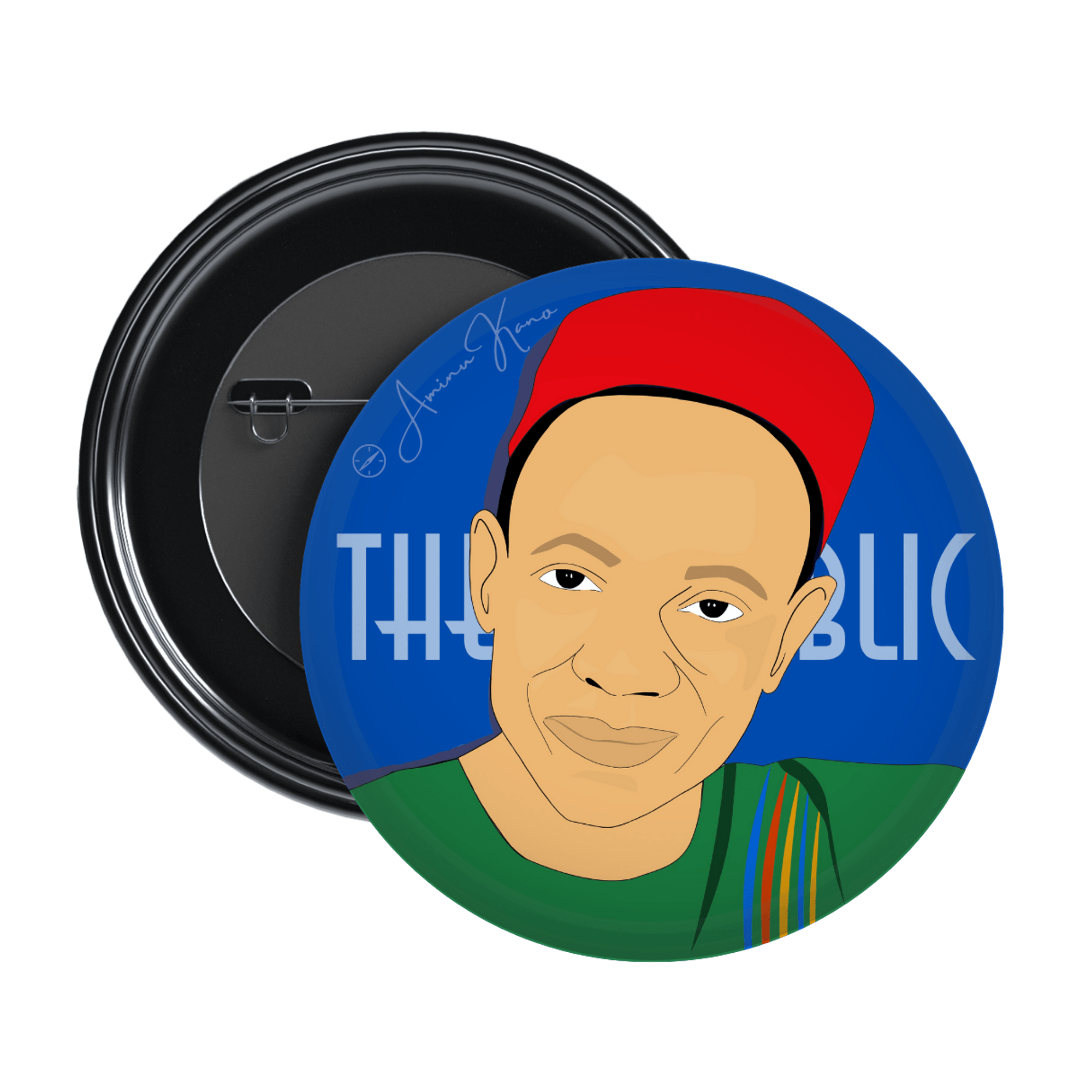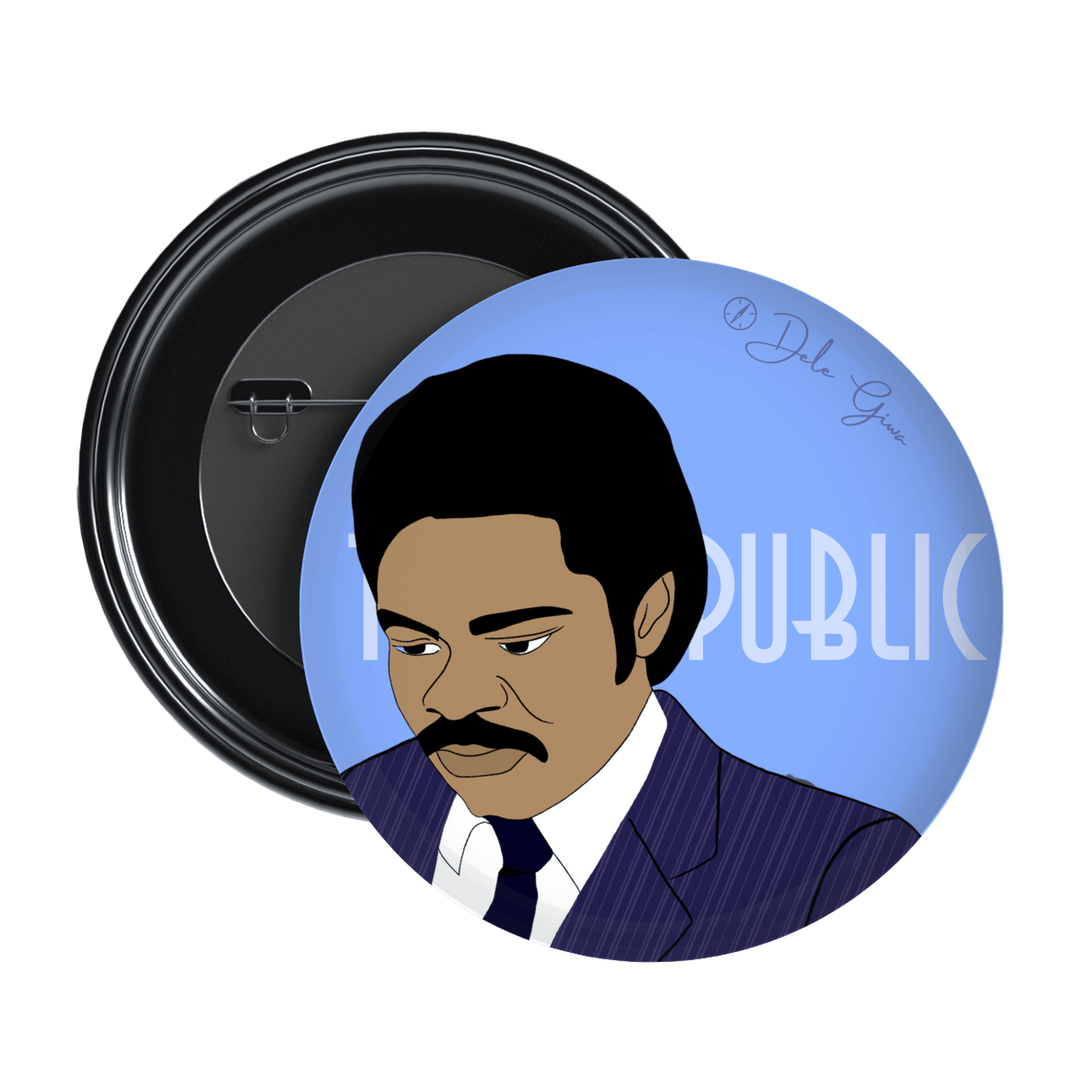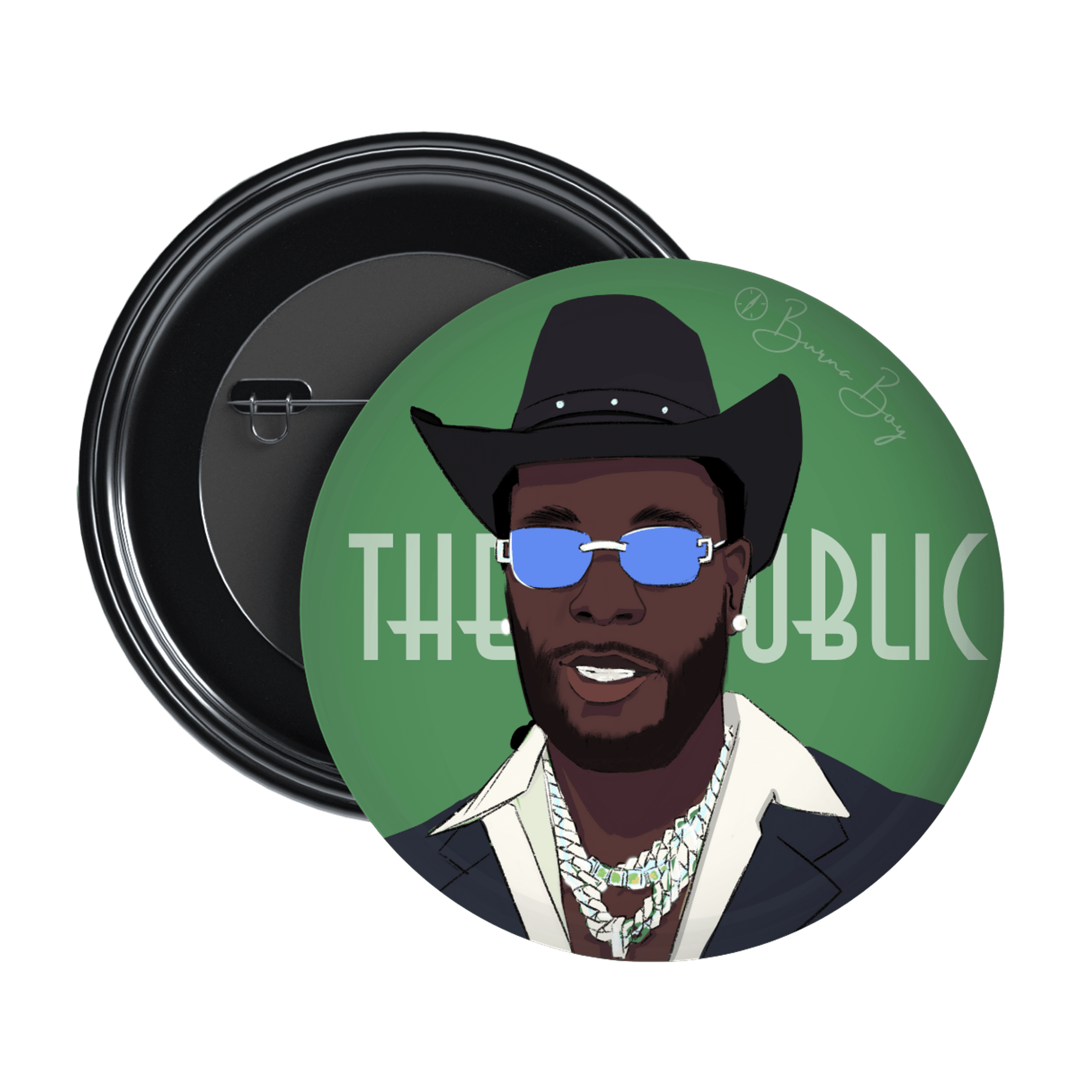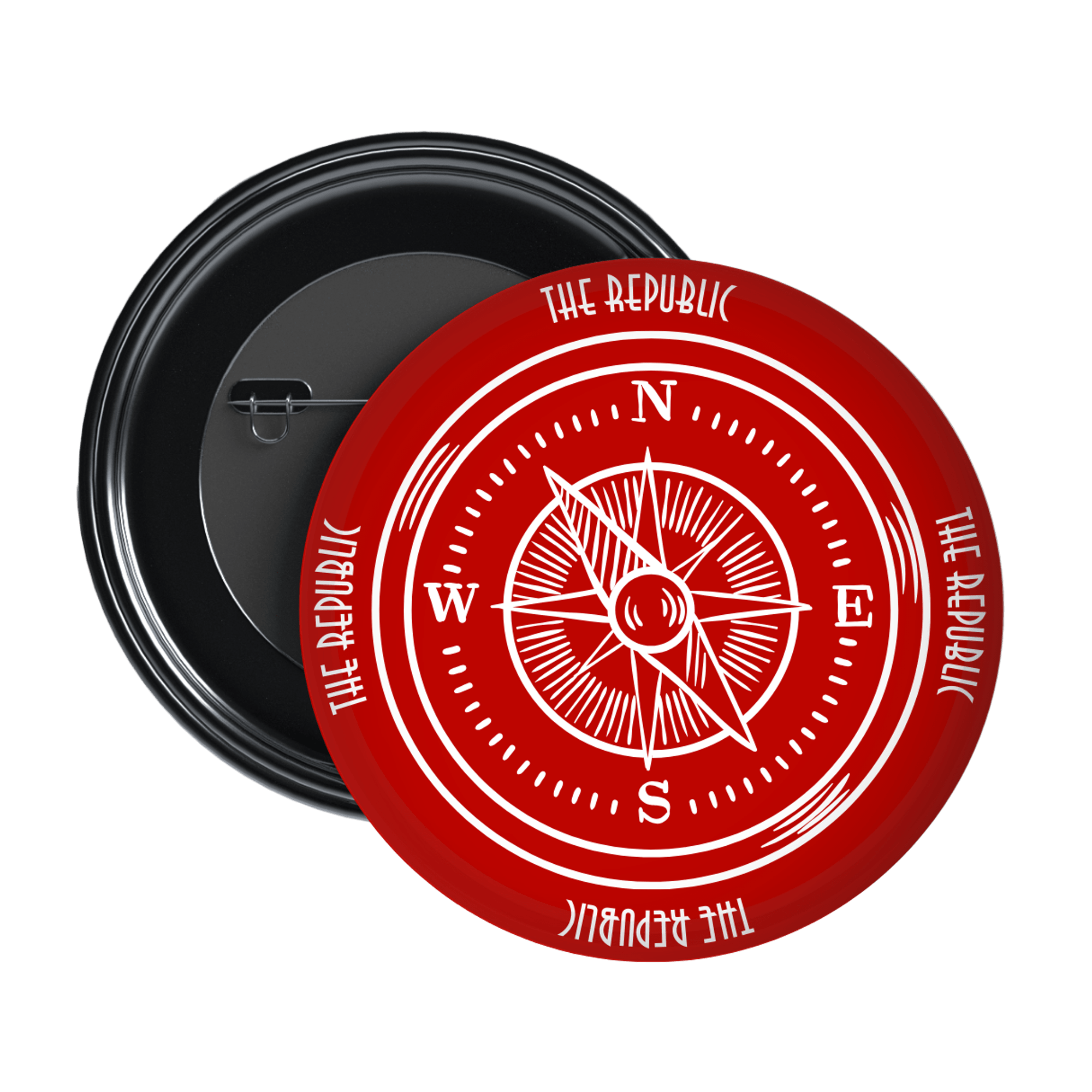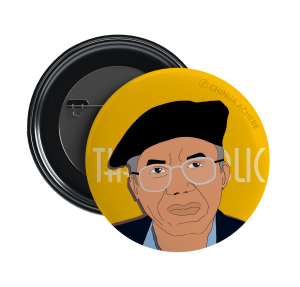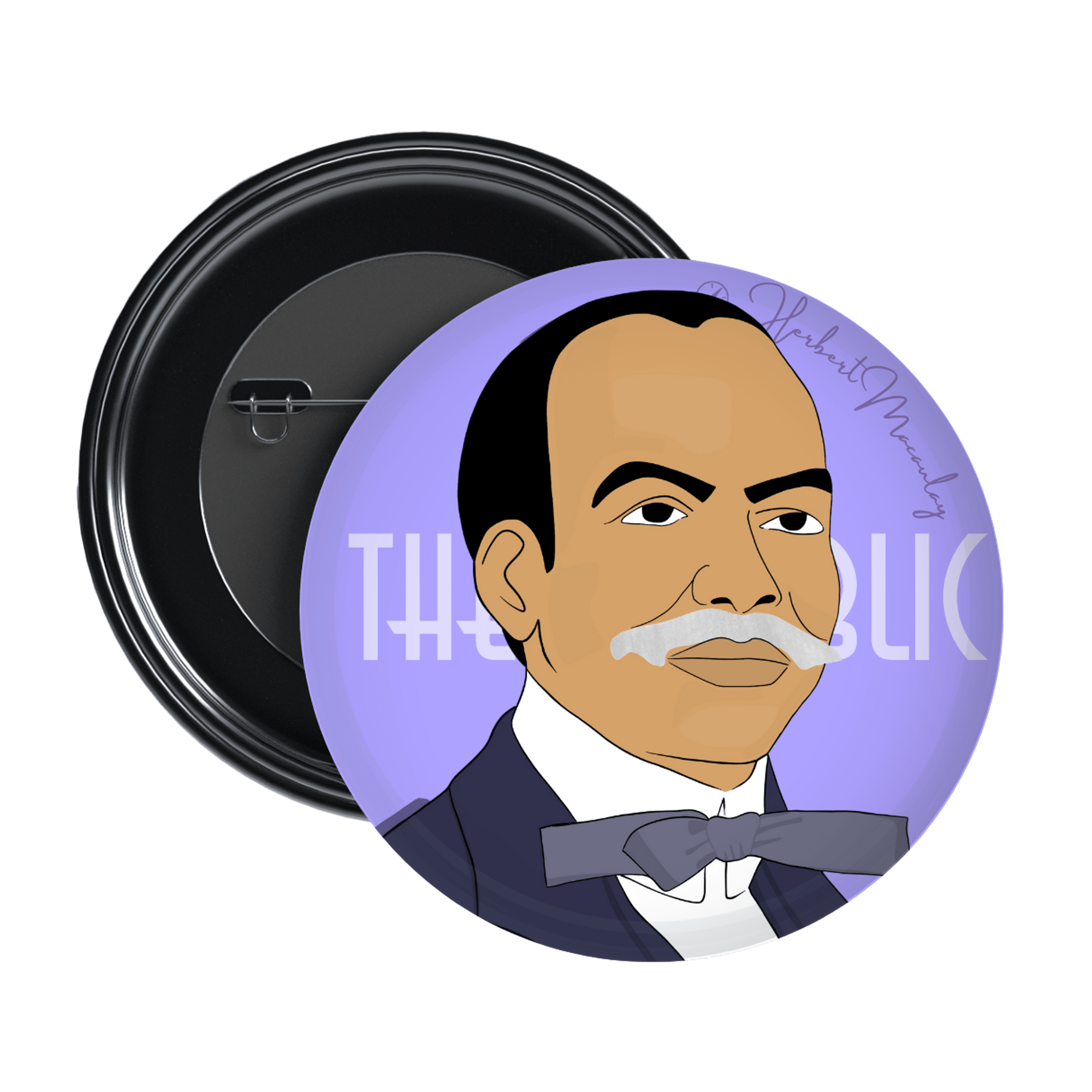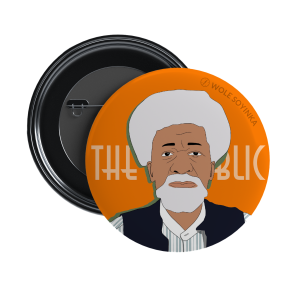
Beyoncé, ‘Renaissance’ World Tour, Tottenham Hotspur Stadium, London, 2023. Raph PH /FLICKR.
the ministry of ARTS / MUSIC DEPT.
A Three-Act Renaissance

Photo collage by Wale Lawal. Reference photos: Mau Forest, Kenya, 2017. Patrick Shepherd / CIFOR.
the ministry of ARTS / MUSIC DEPT.
A Three-Act Renaissance
Like many millennials, I have a little nest egg I have carved out of my earnings as a writer and communications expert and guard jealously. I feather this nest egg infrequently with surpluses I get from side hustles or benefactors instead of channelling these cash infusions into my more hedonistic desires.
It is a big deal for me as a writer in Nigeria to earn enough to have savings. I wasn’t formally trained in media and communications and it is common knowledge that even for professionals, the industry offers very little economic prospects. The basic writer’s salary is less than 100 dollars a month. For a long time, I convinced myself my nest egg was a first step to capitalist prosperity, raw material I could trade for more solid wealth creation tools that finance experts tell us we need, such as stocks and bonds, ETFs, mutual funds, and real estate. Technology made it easier to do this; instant transactions meant I could move this money around at the speed of thought and retrieve it just as easily. I believed I was playing the long game, one where the desired outcome was early retirement, underwritten by multiple streams of passive income.
But then the Coronavirus pandemic happened in 2020, a singularly sobering global event. It started in far-away China, a part of the world so technologically advanced, it might as well be alien to the average Nigerian. The information and images that trickled in at the start of the pandemic focused on markets where zoonotic viruses made the evolutionary leap from exotic animals to people, massive hospitals erected at speeds inconceivable to my Nigerian mind and forced isolation made possible by government surveillance. Then it spread to America, which was as familiar to me as my own backyard, thanks to nearly 30 years of Western media. This time, the news came as a deluge of verifiable reports, gross misinformation, and deaths by the thousands. The world, horrified by how quickly the virus overwhelmed America’s state-of-the-art, for-profit medical complex, shut down its borders and turned away the ‘vital’ commerce it had convinced us was worth bombing sovereign states and killing millions for.
I was on a work trip to South Africa, my first professional international travel opportunity, when the country decided to close its borders. My trip was immediately suspended, and I was rushed through O.R. Tambo Airport and back to Nigeria on an aircraft where flight attendants mandated the wearing of masks. When I returned, a total ban on non-essential activity was ordered, and life in Nigeria as I had left it had ceased. We were ordered to shelter at home for six weeks, enough time for the government to rally whatever skeletal defence it could against a disease that had humbled almighty America.
I was, to my relief, one of the privileged few whose job became even more vital during the pandemic, but far too many livelihoods were instantly vaporized by the first stay-at-home order. Without the great wheel of capitalism to propel us forward, so many people I knew lost hope. Without disposable income and things to do, the lifestyles we had sworn were indispensable were abandoned with almost lightning speed. Essential became the metric by which we sanctioned any kind of social activity, a directive that went against the very soul of Lagos, which was fuelled by chaos and needed outlets for dysfunction. Without churches, clubs and social watering holes, homes became too small, lives became too pedestrian. So, we retreated from our lives and found solace on the internet and its many algorithmic rabbit holes.
MUCH ADO ABOUT MONEY
For all the privileges it bestows, money in the digital age remains as abstract to me as it is to Cuppy Otedola, as the DJ daughter of one of Nigeria’s richest men, Femi Otedola, is known. Sure, it can buy luxuries untold and bestow access to the most exclusive places, but during the pandemic, we saw its limits.
Wealth was powerless in the face of an airborne virus that denied us for two years the simple pleasures of standing in a crowd of strangers and sharing the occasional knowing glance and smile of understanding. All the wealth in the world was useless if it was unsafe to leave our houses. We were forced to wait, billionaire and pauper alike, for the virus to run its course, for enough people to develop viral immunity either through infection or vaccine before life could return to a semblance of normal. Seeing billionaires shelter at home and wholly embrace N95 masks and hourly sterilizations made me question everything I had believed about my nest egg and, more importantly, about wealth.
I realised I didn’t particularly care for stupendous wealth; I never had. I saved because it was expected of me, not particularly because I believed that enough of it would become a ladder out of the crippling pit of poverty. I realised that the pandemic only affirmed what I really believed, a conspiracy many Nigerian millennials I knew secretly harboured: there are hard limits to the functionality of wealth. No amount of wealth can replicate at will the lucid authenticity of a truly spontaneous experience. Money was, at best, a social lubricant, easing certain kinds of interpersonal experiences where power was skewed towards one party.
This is a conspiracy I have come to realise most Nigerian millennials share because we grew up in the age of the internet and were its first guinea pigs. The first decade of my life in Nigeria was spent in a dystopian nightmare of military occupation and a stagnant culture and society, a situation that closely mirrored the generalized uncertainty millennials were born. It was the 1990s, a decade of uncertainty that started with the fall of the USSR in 1991 and ended with the Y2K bubble in 2000. We came of age in the decade of global connectivity, kick-started by the arrival of mobile technology in Nigeria in 2001.
The new century came with several significant technological shifts, each happening at warp speed when compared to previous innovations. The first of these shifts was the invention of the personal computer. It armed every person with a basic education and the tools to easily and accurately document their own lives. The next shift, the internet, allowed us to broadcast these personal accounts to public forums where others could consume them. The third, the smartphone, allowed us to document and share in real-time, and the fourth, social media, allowed us to monetize our experiences down to the most microscopic, pedantic detail as ‘content’. The cumulative result was so impactful that we developed a shared lexicon for what we collectively experienced. We cycled through whole phases of technology in years instead of decades, each cycle of innovation eroding our understanding of ownership and autonomy.
Because of these generational shifts, many of us millennials experienced delayed adolescence as we had to relearn, over and over, how to be adults in a digital world. Because of how meticulously the internet is curated, when something new is discovered, invented or created, there is only a short window of time when we can experience it without any kind of intentional or unintentional priming. In 1999, it would have sounded like science fiction to discover that every person who has contributed in some way to the internet leaves a digital footprint, readily available to everyone else each time they did a web search. But that is our reality today. I have access to 40 years of meticulous documentation from multiple perspectives on almost everything, including my own life, ranging from shallow first-person recollections to scientific explorations to critical analysis. Some of this ‘data’ is hidden behind website paywalls, but most of it is inextricable from my online identity thanks to algorithms, powerful search engines and meta-referencing through memes.
The catastrophic consequences of these innovations became apparent during the pandemic. Confined to my home and experiencing the world almost exclusively through screens, I became convinced that only a handful of experiences were even unique enough to defy this quasi-omniscience of the internet. Everything else had been subjected to the constant documentation, dissection and repurposing that has replaced social discourse. In the pursuit of views and validation, the internet lent itself to performance and flattened nuance in ways that harmed the integrity of my online professional, platonic and romantic relationships.
Without the serendipity of physical interactions, I struggled to recognize intimate experiences in my own life. Watching challenge after challenge, each sillier than the last, weaned me of the desire to perform for my followers, and as the world recovered over the next ten months, the need to experience something unsullied by the internet grew stronger than ever.
ENTER THE RENAISSANCE TOUR
As the pandemic eased, I agitated about how to reintegrate into a world that had shifted axis. During those months of isolation, my primary sources of human interaction outside of my COVID bubbles were the films, books, albums, video games and comedy specials artists had painstakingly made before and during the pandemic. I was also chronically online and saw that I wasn’t the only one who had gained a new appreciation for the devotion that was required to create the kind of work that can approximate the intimacy and serendipity of human interaction. There was a general sense of regret at how dismissive we had all been of the miracle of witnessing the creative genius and an unspoken agreement not to make the same mistakes if we were given another chance to deeply appreciate these artists whose work had shaped our lives.
When the world began to open up, I ventured back outside, burdened with new heights of health-related paranoia and a manic obsession to live as authentically as possible. I had just enough money in my nest egg to chase one elusive experience, and there seemed to be a consensus on what that experience should be.
Exactly two years after the second phase of the Nigerian lockdown was lifted, Beyoncé released ‘Break My Soul’, the first single off her seventh album, Renaissance.
shop the republic
AN ODE TO QUEER JOY
A Beyoncé rollout is a uniquely millennial event, and each one has defined a certain stage in our lives. As an artist, Beyonce straddles the line between pop and semi-autobiographical confessional, the vulnerability of her music lending depth to the fictional eras, complete with faux personas she creates to distinguish between albums. Her first five albums were an exploration of the dichotomy of the artist courting a fandom versus the individual in the public eye, but 2016’s Lemonade marked a tonal shift from first-person confessional to comprehensive social commentary on black womanhood. That was a viral moment, a big enough, novel enough event, that the whole world experienced it in unison with nary an explainer. Renaissance was doing that again, inversely. Her newest album was timely and irreverent, a multi-decade homage to the queer and questioning black ancestors whose influence shaped modern music.
Despite the pandemic, Beyoncé’s NDAs were airtight. There was no visual album or master thesis hinting at what the level of solidarity the world’s most influential living popstar would show with the millennial generation’s most divisive demographic. Beyoncé asked that we all ‘wait and see’. Over the course of 54 shows, she would demonstrate the extent of her conviction. It was a compelling media spectacle, with enough information and background for the world to feverishly anticipate the musical era but nothing to predict how Beyoncé would go about this. It was an event that seemed worth splurging on.
As an alternative black Nigerian, I had a somewhat personal connection to Beyoncé. She was the first black millennial pop star to transcend race in the way Michael Jackson had for my parents. And where Michael was pressured to deemphasize the influence of blackness and queerness in his work to appeal to mass audiences, Beyoncé revelled in hers. I had missed a rare opportunity to see her perform at the start of her solo career when she was invited to Nigeria by a politician in 2006, long before the global superstardom and the massive tours. I didn’t back then because even though it was just a few states over, the trip was too expensive for a younger, less financially independent me.
The internet had barely penetrated Nigeria in 2006, and the obsessive fan pages that track Beyoncé’s every movement today barely existed then. All that survives of her performance is a grainy video of her singing the Nigerian anthem in deference to her hosts. Then, during the pandemic, she collaborated with Nigerian artists on a companion album for The Lion King, a film that was integral to our understanding of Africa, even for Africans. It was a move that forged a deep connection between her artistry and the global south. Even quieter, she donated towards the Nigerian #ENDSARS movement through FEMCO, a Nigerian feminist non-profit, endearing her even more to the Nigerian members of her fandom, the Hive.
Beyonce is an artist who understands the global nature of the internet and leverages it in her artistry. So, it really shouldn’t have come as a surprise to anyone that in 2023, Africans at home and in the diaspora were making it a canon event to see Beyoncé in concert, even if it meant they had to travel out of Africa to do it.
17 years after that performance in 2006, I was one of those Nigerians who had enough money to play the visa lottery and go see Beyoncé somewhere in Europe where tickets were cheaper, and the cost of living was not so cutthroat. It was a lot of money, but for the first time in my adult life, I genuinely considered depleting that nest egg in pursuit of a once-in-a-lifetime experience.
I didn’t for the very reason everyone expected me to.
My nest egg could have gotten me to the Beyoncé concert, but I wouldn’t have needed it if I didn’t live in a country crippled by dysfunction. The Renaissance World Tour had 54 stops, each chosen because it had sufficient infrastructural development to support the exaggerated spectacle that was built around Beyoncé’s opus. Sure, I could escape the dysfunction here and travel to see her, but I could not justify enduring the horrors of the visa application system or dealing with the indignities of immigration or a weak currency just to investigate my little conspiracy. It didn’t matter if I bought the Beyoncé ticket or not; I was still a part of this spectacle because I was a child of the internet. I understood why others had gone to great lengths to secure tickets and why it mattered to them.
The real novel event was not the tour or even the build-up to the first performance; it was the day tickets went live. This was the first time in our lives that the cost of a Beyonce ticket was pricey but no longer prohibitive for most middle-class millennials, including me, a Nigerian in a third-world country. It was a decade late, but a sizeable percentage of us could finally afford to participate in this moment, either with our earnings or savings. We had enough social mobility to make this dream a reality. Waking up on the morning tickets went live to see thousands of us update our feeds as we feverishly refreshed the ticket page offered just as much validation as the concert itself; this collective ‘transition’ into adulthood via a mass acknowledgement of our financial emancipation.
shop the republic
WHAT IS THE TRUE VALUE OF A RENAISSANCE TICKET?
If you bought a house in Nigeria in the 1960s, it said far less about you than a Beyoncé ticket in 2023. It sounds a little crazy to say this out loud, but in this era where ownership is untenable for the average middle-class professional, using precious savings/potential revenue to see a pop star says a lot about your relationship with money and your understanding of social capital.
Social capital has always been important but never as important as it is now. Social networks used to be small and difficult to maintain, but technology has made it possible to form parasocial relationships with millions of people at a time and yield very tangible privileges from those relationships.
Because of social capital, I was not thrust into responsibility and the unpleasantness that has come to define wage work. The academic and cultural exposure it brought me worked like a visa, bypassing all the strict scrutiny that those who couldn’t offer intangible credentials such as an education or work experience had to endure before they could even be considered useful enough to experience the privilege of social order. I had an exhaustive reservoir of cultural context and an enviable network of acquaintances, mentors and peers I could rely on to navigate social interactions, vital tools in a society that relied as much on appearances as it did on merit. It afforded me enough runway to grow into responsibility, equipped me with enough social markers to weasel my way into one of the specialized industries that anchor the public and private sectors and, with them, society.
Within these industries, I saw that social capital and money were complementary but not equal. Social capital got me into the rooms where I could earn money as a reward for my skills or barter money for access to the people who owned or guarded resources. Money was there to be used, but true value lay in social capital and how much influence a person could wield because of it.
I learnt that in more functional societies, hoarding money was distasteful, the kind of misstep that could damage decades of hard-earned respectability. The agreement that governed ‘civilized’ societies was that workers needed to be compensated for their labour so that wealthy people could manage the institutions and extract the resources without contest. The worker earned enough to create a bubble of comfort while the ultra-rich experienced true convenience. Any privileged person who was caught openly contravening this informal agreement was reprimanded through ostracization within his social class.
But here in Nigeria, there were and still are few people respected or noble enough to be allowed to ostracize one of their peers and have everyone else follow suit. What we have is pervasive lawlessness, a corrupt social hierarchy that has no systems to speak of, and no one committed to investing the resources needed to build a working system. Our wealthy hoard money because they lack nobility, and as such, there is no honour in their relationships with each other. Money is overvalued because all parties know it could be stolen, embezzled or scooped out of a fallen fuel tanker in the middle of a scorching day. Without the system, they could never own the resources they really wanted, even when it was legally earned. Every convenience they enjoy is one coup, executive directive or senatorial bill away from being wrested away. We learned that our money was better spent for the purpose of self-sufficiency and eventually self-governance, instead of investing in the ‘system’.
I could save money because at least mine was obtained legally, but the hoarding majority of politicians and their politically exposed friends, families and associates could not. Tangible assets acquired with illegitimate funds were untenable; the very nature of how ownership was transferred weakened its legality. Laundering illegitimate wealth back to its original value is time-consuming, wasteful and unreliable. Only the most diligent succeeded; most people capitulate and buy whatever facsimile of unequivocal social acceptance their illegitimate wealth can safely procure. The Yahoo boy (Hushpuppi) barters money for social media real estate, a virtual fiefdom where he could command adoration through lavish displays of wealth. His money cannot buy controlling stocks in the legendary House of Gucci without raising eyebrows so he settles for enough Gucci bags to be invited to the Paris Fashion Week for their ultra-exclusive client gala. Because we are a generation that hoards, our private floats of liquid assets come to represent our freedoms, our status and our future upward mobility.
There is a theoretical point where social capital and wealth become abstract to the wielder. How this manifests is influenced by a person’s existing relationship with wealth and the privilege of social capital. Our culture of hoarding material wealth is in direct conflict with the digital world in which I must perform adulthood. Physical assets no longer offer me security in the way they offered my parents; investments are no longer stable repositories of wealth in a world where a tweet from a billionaire can tank a business.
My life is being lived increasingly online on the internet, a domain that abhors hoarding, exalts profitability over value and proves social capital can earn or lose a person millions of dollars in sponsorships, patronage and branding. I am rewarded for my ability to market myself as authentic and profitable, irrespective of true value. Everything must be leveraged or risk being lost to a more opportunistic person. I must work constantly on my digital real estate; performative work hides all the effort, resources and manpower that goes into creating a resonant moment. Even when the effort is shown, that must also be curated into a pleasant format that does not dismay the audience.
My online audience expects newness and novelty, even if it is performed. But my online audience also expects familiarity as evidenced by the 1000s of copycat trends that flood the internet. It is an impossible ask, but the internet rewards people who manage to straddle this line in ways that are inconceivable elsewhere. Websites pay for homes; Instagram profiles fund trips and one viral moment can set me up for life. Everything is performative, so the few pockets of genuine authenticity that remain are worth a premium.
shop the republic
SO, WHAT IS THE TRUE COST OF A RENAISSANCE TOUR TICKET?
Liquid assets hoarded in our savings and investment accounts cannot yield value in the virtual world. They must be bartered for access, in this case, to join an exclusive group of people who have seen the world’s biggest living pop star perform her most elaborate spectacle yet. A star whose name is instantly recognisable in every corner of the internet, whose honorific was earned through two decades of longevity in an industry infamous for burnout and erasure. It is the opportunity to have your experience of this spectacle corroborated by thousands of other people through videos, pictures, tweets and essays, to become a perspective through which this canon event can be revisited.
It is the kind of social capital that stays evergreen in a digital wasteland where global trends burn out in mere days. Merch can be resold, personal accounts of the concert told to a ready audience on YouTube channels or social media accounts for a boost of visibility, pictures and videos repurposed as memes for a million other contexts like Sainthoax, all of which the internet will pay for. The value that can be extracted from an event like this is limited only by the intelligence and ingenuity of the user.
Money has been unseated as the primary metric of value. Sure, it can buy luxuries untold and bestow access to the most exclusive places, but its binary nature weakens its influence. You cannot simply buy your way into understanding the omnilingual power of a meme. And if a meme can be converted into a shitcoin that intelligent men and women with business degrees spend millions of hard-earned dollars to buy into because they have grown up on the internet and are beholden to its intangible power structures, then we have been forced to divest from chasing wealth and hoarding it as a buffer against the terrifying prospect of a future where the all-encompassing reach of our digital lives erodes the artificial barriers that protect our offline politics, relationships and identities.
But if the new metric of value is attention and eyeballs, how do you use it ethically?
I invite you to witness Beyoncé, the most influential millennial of our lifetime. She is coming into her own as a woman, allying herself with the queer community and reclaiming her artistry in one swoop. It is a once-in-a-lifetime event, made even more poignant and more resonant because that moment coincides with our collective emancipation into our iteration of adulthood, one that is fundamentally different from the generation before us and will be fundamentally different for the generation after us.
Beyoncé breaks the fourth wall that separates the performer from the audience. She understands the value of a meme baked into a performance and how internet references work as a shorthand for community. The Renaissance tour is intersectional but fiercely black, focused on redistributing wealth by platforming overlooked black, queer elders and contemporaries and a damn good time. There are thousands, nay, millions of people who are simultaneously benefitting from this shared experience, who have been invited to participate as performer and audience in this moment because Beyoncé has redefined the concert experience to accommodate this.
She further demolishes the artificial barriers that separate artists from the audience with the Renaissance film, an immersive, technicolour sci-fi fantasia released exactly two months after the last tour date, an impossible timeline for something so elaborate. The true marvel of the film is how brilliantly it replicates the technical cohesion and artistic excellence of the Renaissance experience in the tiny cinema hall where I first saw it in Victoria Island while somehow preserving the emotional integrity of the most vulnerable version of Beyonce we have seen since Life Is But A Dream, released in 2013. And tucked into every other scene are millennials, featured solo or in groups, in silver costume or drag, canonised as an integral part of this myth-making event.
Each performance extends beyond the concert venues into the deepest reaches of the internet, a specific brand of nihilism that challenges the dogma that positions money as the ultimate arbiter of access. Everyone, black and queer, is welcome to shape the experience in their own image, to make their own mythos, to generate their own social capital. Beyonce released Cowboy Carter, the second act of her three-album run six months after Renaissance. It is a swirling sonic epic that tackles the problem of race and genre in country music with as much nuance and nihilistic irreverence as the first did with queerness and erasure in House/Dance Music, platforming 6 generations of black cowboys and country folk as she challenges the systems that many say have created her and proves that they can be subverted. With each project, she brings conversations that often skirted around to the mainstream and centres the voices of those traditionally excluded from profiting from the largesse of social capital these genres and industries can confer.
Losing money as an anchor for our lives is a terrifying prospect, but one that I think we can survive if we embrace our responsibility as the first digital natives of the supercontinent that is the www, a liminal space where we live simultaneously online and offline, speak in meme and traffic in novelty with this specific brand of nihilism against the cult of capitalism⎈




